
Fair trade is a term for an arrangement designed to help producers in developing countries achieve sustainable and equitable trade relationships. The fair trade movement combines the payment of higher prices to exporters with improved social and environmental standards. The movement focuses in particular on commodities, or products that are typically exported from developing countries to developed countries but is also used in domestic markets, most notably for handicrafts, coffee, cocoa, wine, sugar, fruit, flowers and gold.

Australian cuisine is the food and cooking practices of Australia and its inhabitants. Australia has absorbed culinary contributions and adaptations from various cultures around the world, including British, European, Asian and Middle Eastern.

The Sanitarium Health and Wellbeing Company is the trading name of two sister food companies. Both are wholly owned by the Seventh-day Adventist Church.

The cuisine of New Zealand is largely driven by local ingredients and seasonal variations. As an island nation with a primarily agricultural economy, New Zealand yields produce from land and sea. Similar to the cuisine of Australia, the cuisine of New Zealand is a diverse British-based cuisine, with Mediterranean and Pacific Rim influences as the country has become more cosmopolitan.
The Limelight Department was one of the world's first film studios, beginning in 1898, operated by The Salvation Army in Melbourne, Australia. The Limelight Department produced evangelistic material for use by the Salvation Army, including lantern slides as early as 1891, as well as private and government contracts. In its 19 years of operation, the Limelight Department produced about 300 films of various lengths, making it one of largest film producers of its time.
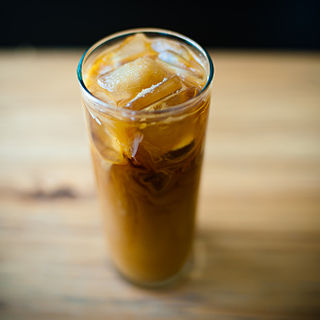
Iced coffee is a coffee beverage served cold. It may be prepared either by brewing coffee normally and then serving it over ice or in cold milk or by brewing the coffee cold. In hot brewing, sweeteners and flavoring may be added before cooling, as they dissolve faster. Iced coffee can also be sweetened with pre-dissolved sugar in water.

The Fairtrade Foundation is a charity based in the United Kingdom that aims to help disadvantaged producers in developing countries by tackling injustice in conventional trade, in particular by promoting and licensing the Fairtrade Mark, a guarantee that products retailed in the UK have been produced in accordance with internationally agreed Fairtrade standards. The foundation is the British member of FLO International, which unites FLO-CERT, 25 National Fairtrade Organisations and 3 Producer Networks across Europe, Asia, Latin America, North America, Africa, Australia and New Zealand.
Cafédirect is a UK-based alternative trading organization.

Herbert Henry Howard Booth was a Salvation Army officer, the third son of five children to William and Catherine Booth (Mumford), who later went on to serve as an independent evangelist. He oversaw the Limelight Department's development and he was the writer and director for Soldiers of the Cross.
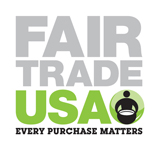
Fair Trade USA, formerly "TransFair USA", is a 501(c)(3) non-profit organization that sets standards, certifies, and labels products that promote sustainable livelihoods for farmers and workers and protect the environment.

Equal Exchange is a for-profit, Fairtrade worker-owned cooperative headquartered in West Bridgewater, Massachusetts. Equal Exchange distributes organic, gourmet coffee, tea, sugar, bananas, avocados, cocoa, and chocolate bars produced by farmer cooperatives in Latin America, Africa, and Asia. Founded in 1986, it is the oldest and largest Fair Trade coffee company in the United States. The highest paid employee of Equal Exchange may not make more than four times what the lowest paid employee receives.

Fairtrade Canada, formerly TransFair Canada, is a national non-profit certification and public education organization promoting Fairtrade certified products in Canada to improve the livelihood of developing world farmers and workers. It is the Canadian member of FLO International, which unites 24 fair trade producer and certification initiatives across Europe, Asia, Latin America, North America, Africa, Australia and New Zealand.
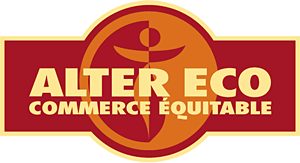
Alter Eco refers to two alternative trading organizations, founded in 1998 by Tristan Lecomte in France, and followed by Mathieu Senard and Edouard Rollet in the United States, and Ilse Keijzer in Australia.
The fair trade movement has undergone several important changes like the operation for ten thousand villages to open their businesses since early days following World War II. Fair trade, first seen as a form of charity advocated by religious organizations, has radically changed in structure, philosophy and approach. The past fifty years have witnessed massive changes in the diversity of fair trade proponents, the products traded and their distribution networks.
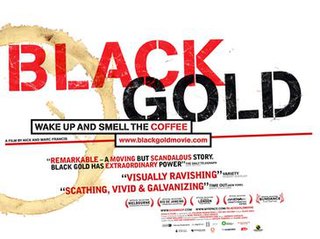
Black Gold is a 2006 documentary film that follows the efforts of an Ethiopian coffee union manager as he travels the world to obtain a better price for his workers' coffee beans. The film was directed and produced by Marc James Francis and Nick Francis from Speakit Films, and co-produced by Christopher Hird. It premiered at the 2006 Sundance Film Festival.
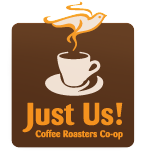
Just Us! Coffee Roasters Co-op is a Canadian importer of fair trade coffee, tea, sugar, and chocolate. Based in Grand Pré, Nova Scotia, Just Us! products are sold throughout Canada, typically in shops specializing in fair trade goods such as Ten Thousand Villages. Their motto is “People and the Planet before Profits”.
Direct trade is a form of sourcing practiced by certain coffee roasters, chocolate makers, tea sellers, gemologists and more who build direct relationships with the farmers, artisanal miners and processors who sell their products. There is no single set of direct trade standards, and specific trade practices vary as a reflection of business and ethical priorities of the roaster or maker. Generally speaking, however, direct trade practitioners view their model as one of mutually-beneficial and transparent trade relationships.
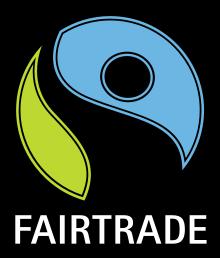
A fair trade certification is a product certification within the market-based movement of fair trade. The most widely used fair trade certification is FLO International's, the International Fairtrade Certification Mark, used in Europe, Africa, Asia, Australia and New Zealand. Fair Trade Certified Mark is the North American equivalent of the International Fairtrade Certification Mark. As of January 2011, there were more than 1,000 companies certified by FLO International's certification and a further 1,000 or so certified by other ethical and fairtrade certification schemes around the world.
Fair trade is where a farmer or craftsperson is paid a fair price for their product, one that represents its true worth, not just the lowest price that it is possible to pay. This is a price that covers the cost of production and enables the producer to live with dignity. Fair Trade New Zealand is an organisation that was launched in 2005 which supports fair trade by ensuring that farmers and workers' rights are not exploited. According to Oxfam New Zealand, there are several companies to support fairly traded goods from, which are exported to New Zealand. From 2013-2014 there were 42 Fair Trade Licensees and Traders in New Zealand. From 2015-2016 this number rose to 54 Fair Trade Licensees and Traders in New Zealand. Gwen Green, Oxfam's Engagement Director, says: "when farmers are paid fairly for their products, we see people able to make real improvements to their lives and their communities. Producers who used to struggle to feed their families are able to give their children an education, and communities can build schools and develop businesses. It is one of the smart solutions to poverty". In 2009, Wellington became the first fair trade capital city in the Southern Hemisphere. In 2017, Whangarei was recognised by the Fair Trade Association of Australia New Zealand as being one of four fair trade councils in New Zealand, and the first fair trade district in New Zealand.
Minnie Lindsay Carpenter, née Rowell, was an Australian writer and an officer in The Salvation Army in Australia. She authored more than twelve books about Salvationist history. She also helped establish the Salvation Army International Nursing Fellowship and served as World President of the Home League. She married George Lyndon Carpenter, a Salvationist who was later elected as the fifth General of the Salvation Army in 1939.













